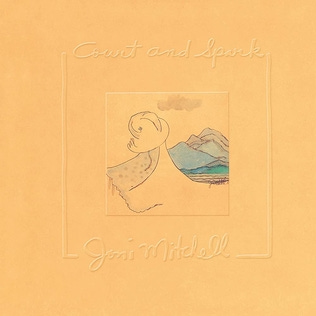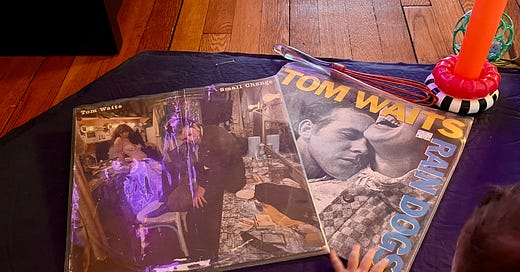For some reason our baby isn't responding to Tom Waits
Mansplaining music to an eight-month-old is yielding mixed results. Nevertheless I persist.
Maybe by the time our daughter is an adult, the fitful momentum of social change will have unwound some of the gendered double standards that are normal features of life today. A lot can happen in a few decades, after all. For example, the number of women CEOs of Fortune 500 companies has increased from literally zero in 1995 to more than 50 today. Talk about progress!
Except, if I may offer a counterpoint, why the hell would anybody want to become a CEO? And how much more of a bloodthirsty capitalist maniac does a woman need to be, compared to a man, in order to step over all of the still-twitching carcasses that would have to fall in order for her to reach that position?
If our child ends up succeeding in a terrible job for a corporation that drowns baby seals in crude oil, or whatever huge companies do, it won’t be because of anything I’m capable of teaching her. We’ll be measuring achievement differently. My idea of success would be that she has an educated opinion about first-wave shoegaze, or that she will be able to differentiate yacht rock from conventional adult contemporary, or that she can decisively argue why Undercover, not Tattoo You, was actually the last great Rolling Stones record. Success would mean that when some twerp starts talking her ear off about The 1975 (or whatever will be considered “classic” by the time she’s old enough for this to happen), she can shout, “My dad already told me all that!” and then throw a drink in his face and storm off, to the bewilderment of everyone else in the room.
We have a lot of work ahead of us, but luckily there is time. As an eight-month-old baby, she currently has fuck-all to do besides eat, sleep and listen to me pontificate about the significant artists and albums in the record collection that thus far constitutes the bulk of her inheritance. I have started an ongoing project where I regularly pull out a few titles and manfully explain them to her. (Someone should coin a term for that.) You can read the first installment of this series here. Below I have transcribed from memory the contents of my latest disquisition, which I feel is important for future reference, as the evidence suggests she has yet to retain any of it. I’m not mad about that, just a little disappointed.
On we go, then.






Tom Waits: Closing Time (1973); The Heart of Saturday Night (1974); Small Change (1976); Heartattack and Vine (1980); Rain Dogs (1985); Mule Variations (1999)
A strange thing you will learn about popular music is that the less superficially good a person’s singing voice is, the more seriously you are supposed to take them as an artist. The reasoning is that if they were a good singer, they would just sing whatever was in front of them and it would sound lovely. But if a performer is out there singing despite the seemingly prohibitive handicap of not having a pleasant-sounding voice, it must be because they have something very important to say. Worrying about this logic will get you nowhere, but if an artist’s voice is regularly described as “unique,” or “an acquired taste,” or “utter dogshit,” be advised that a lot of people, men in particular, are going to have strong feelings about them, which they will subject you to if given the opportunity.
By far the most famous example of this phenomenon is Bob Dylan. Under no circumstances should you ever ask a man an open-ended question about Bob Dylan unless you don’t have anywhere to be for the next few hours. We’ll maybe get to him at a later date, but I honestly wouldn’t know where to begin, and I usually make a point of staying as far away as possible from the world of Internet Dylanologists, which I regret to inform you is a real subspecies of human male.
The second most popular artist in this category is Tom Waits, whose voice sounds like all of your favorite muppets being burned alive at the same time. Perhaps this is why you have yet to connect with any of his music, even though I’ve been playing you a bunch of really premium shit. I called your pediatrician’s office to make sure this wasn’t something to worry about, and they seemed alarmed, although I think that’s more so because of how I phrased the question, which was: “What do I do if my baby is unresponsive…to the early albums of Tom Waits?”
Now, the best place to start with his discography, obviously, is anywhere in the 1970s, and after that it’s a mixed bag. I grabbed a random album by Mr. Waits from a used CD store many years ago, and luckily for me it was Mule Variations, an absolute gem from his later period that ended up being a great entry point. But anything else from the ‘80s onward is just as likely to sound like nightmare circus music. And some of that stuff is excellent, but I couldn’t really handle it until I was in my 30s and had read several Charles Bukowski novels and woken up in some strange places, whereas you are currently a baby.
The best way to describe Mr. Waits is that he seems like a character from a Tom Waits song. He could be a supporting figure from almost any type of American story: a grizzled prospector in a Western, a detective in a noir film, a cartoon sidekick in a Disney movie, a killer with a horrifying nickname in a procedural drama, the dad in a romantic comedy, the nomadic protagonist in a midcentury folk anthem or the cautionary older boozehound from a Bruce Springsteen record. He is many things, but not any one specific thing, least of all a conventionally gifted singer, which in his case is just part of what makes him interesting and good. He’s not really even singing so much as croaking with the perspective of a thousand lifetimes.
What makes him great, though, are the priceless pieces of advice that appear throughout his catalog. I have collected some examples:
The more you drink, the harder it is to hold up a lamp post.
If you exorcise your demons, the angels might leave, too.
There is always free cheese in a mousetrap.
Fishing for a good time starts with throwing in the line.
Money’s just something you throw off the back of a train.
You don’t meet nice girls in coffee shops.
Never trust a man in a blue trench coat; never drive a car when you’re dead.
On a freighter to Singapore, the best poker player is always the one-armed dwarf.
There is a lot to chew on here. Unfortunately most of these lessons won’t make sense until you’ve experienced a few whiskey hangovers in distant port cities, and that probably won’t happen for at least 14 years.






Joni Mitchell: Clouds (1969); Ladies of the Canyon (1970); Blue (1971); Court and Spark (1974); The Hissing of Summer Lawns (1975); Hejira (1976)
This is something you might as well learn now: No matter how deeply an artist’s work moves you, no matter how seen their words make you feel, no matter how much wisdom they provide to guide you through life’s rocky passages, no matter how much solace they offer during moments of heartbreak, there is always a chance that they had an extensive blackface period.




